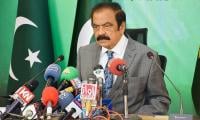Pakistani paediatric oncologists should collaborate with international health agencies so that they can come up with strategies and solutions to elevate the care and management of childhood cancer in the country.
Special Assistant to Prime Minister on Health Dr Faisal Sultan said this on Friday in his virtual address at the inaugural ceremony of the 6th Pakistan Society of Paediatric Oncology (PSPO) symposium at the Aga Khan University Hospital (AKUH).
“Cancer is a global health problem and burden of cancer is increasing in Pakistan too. Children with cancers are the most vulnerable patients in Pakistan but I hope that our paediatric oncologists would meet the goals of the World Health Organization’s global initiative for childhood cancer to increase the survival rate among children who have cancers,” Dr Sultan said.
Country Representative of World Health Organisation (WHO) Dr Palitha Mahipala, AKUH’s Dr Adil Haider, Dr Asim Belgaumi, Dr Shamvil Ashraf as well as experts from Africa, Latin America and other countries also spoke at the inaugural ceremony of the symposium and called for improving childhood cancer survival rate.
Dr Sultan appreciated the efforts of the Pakistan Society of Paediatric Oncology (PSPO) in making the childhood cancer a priority for care in Pakistan. He added that paediatric oncologists associated with the PSPO were performing a critical work to reduce the sufferings of children with cancers in the country.
“Every child with cancer deserves the right to cancer care and the PSPO is striving to achieve this goal. I’m pleased to learn that training programmes and fellowships are being arranged for the physicians and other healthcare workers in the field of paediatric oncology. These trainings and programs will definitely increase their capacity and overall awareness regarding treatment and management of childhood cancer in Pakistan,” the special assistant to the prime minister remarked.
Dr Mahipala said every day, more than 1,000 children are diagnosed with childhood cancer in the world and unfortunately, most of these children lived in low- and middle-income countries where treatment was either unavailable or unaffordable for their parents.
“Only one third of children with cancers in low- and middle-income countries survive compared to a large number of childhood cancer patients in high income countries,” he said and added that political commitment was required to achieve the goals of the WHO’s initiative to increase the survival of children with cancers from 30 to 60 per cent all over the world.
Dr Belgaumi said that every year around 8,000 to 12,000 children developed six different types of cancers in Pakistan but only around 5,000 were diagnosed and hardly 1,500 managed to survive due to treatment and management at healthcare facilities.
Calling for the government support to increase the diagnosis and treatment facilities for childhood cancers in Pakistan, he said the AKUH and PSPO were collaborating with the WHO and other international organisations for the capacity building of physicians, nurses and paramedics to identify the childhood cancers and refer them to specialised healthcare facilities.
Dr Ashraf paid glowing tributes to Prof Nizam-ul-Hasan, former president of the Child Aid Foundation (CAF) and former director of the National Institute of Child Health, who spent his whole life in treatment of children with cancers.







